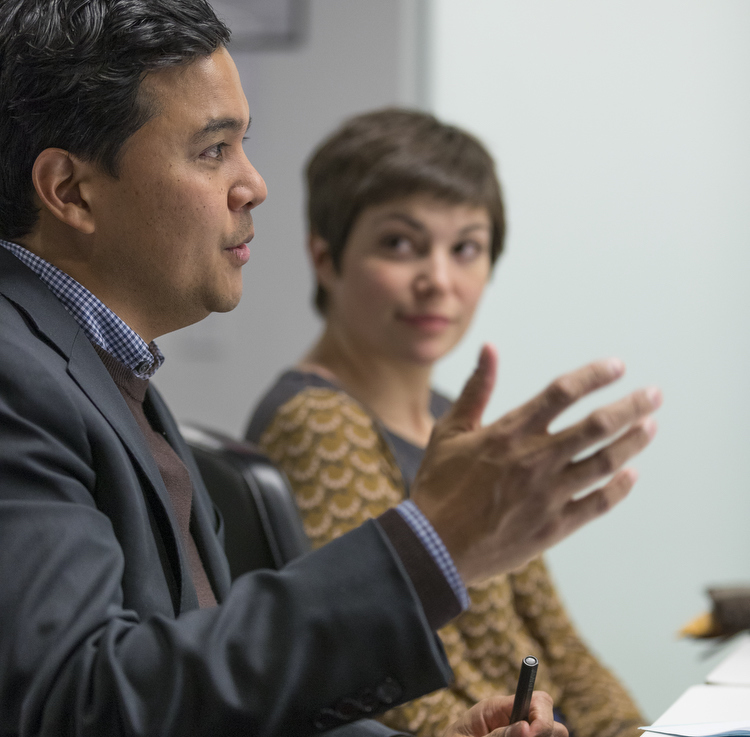By Louis DiPietro
The Technology and Law Colloquium – a hybrid Cornell University course and public lecture series – will return this semester with talks from 13 leading scholars who study the legal and ethical questions surrounding technology’s impact in areas like privacy, sex and gender, data collection, and policing.
The lectures will take place throughout the Fall semester at 1:30 p.m. (EST) on Fridays in Statler Hall, unless otherwise noted. Though in-person attendance is limited to only students enrolled in the course, lectures can be attended virtually via Zoom, and most talks will be recorded and made available at the colloquium website.
Kate Klonick, a law professor at St. John’s University who researches speech, privacy, and online platforms, will kick off the Fall slate on Friday, September 3.
“It’s impossible to not acknowledge the role platforms and artificial intelligence play in everyday life in big and little ways, from vaccine misinformation to autonomous vehicles. Our students almost universally acknowledge the need to think seriously about ethics in technology,” said Karen Levy, an assistant professor in the Department of Information Science, associate faculty member at the Cornell Law School, and the course’s instructor. “Simply acknowledging and calling out problems of bias in algorithms or the existence of privacy invasions used to be considered a step forward. Now the questions are: What do we do about it? How can we make accountable decisions and balance between different policy goals? How do we make sure people are not harmed? These aren’t exclusively technology questions.”
laterno levy.jpg

Now in its third iteration, the Tech/Law Colloquium – or INFO 4113/6113/LAW 7113 – is a joint collaboration between Cornell University’s Department of Information Science within the Ann S. Bowers College of Computing and Information Science and the Cornell Law School. It was launched in 2017 with the goal of educating students on the ways technology and innovation can, and have, run afoul on civil rights – intentionally or unintentionally – while addressing relevant questions on matters of ethics and law.
Following each talk, the roughly 60 students enrolled in the colloquium course will participate in an in-depth workshop with the colloquium speaker. This dialogue with the presenter, Levy said, offers students a unique perspective into the research-development process.
“I want students to understand how fundamentally difficult these problems are. There’s often not an obvious “good guy” or “bad guy,” and no easy fixes—and we do students a disservice if we frame things that way. There are difficult tradeoffs,” Levy said. “I want students to come away with the understanding of how complex these problems are, and how much they affect our everyday lives.”
The Tech/Law Colloquium is supported by the Department of Information Science, the Cornell Law School, and the MacArthur Foundation.
The Fall 2021 schedule:
September 3: “Is Facebook’s Oversight Board Working?" Kate Klonick, St. John's University School of Law
September 10: “Westlaw, Lexis, and Elsevier Are Also Data Brokers. What Does That Mean for Professional Responsibility and Ethics?" Sarah Lamdan, CUNY School of Law
September 17: "AI-Mediated Communication, Legislative Responsiveness, and Trust in Democratic Institutions," Sarah Kreps, Cornell University
September 24: “Intimate Privacy: A Civil Right," Danielle Citron, University of Virginia School of Law (note: talk begins at 2:00 pm)
October 1: [title TBD], Alessandro Acquisti, Carnegie Mellon University
October 8: "The United States of Anonymous: How the First Amendment Shaped Online Speech," Jeff Kosseff, United States Naval Academy
October 15: "The Significance of Private Rights of Action in Privacy Regulation," Lauren Henry Scholz, Florida State University School of Law
October 22: "Human-AI Interaction Design at Scale: Practices, Methods, Challenges," Qian Yang, Cornell University
October 29: "Predict and Surveil: Data, Discretion and the Future of Policing," Sarah Brayne, University of Texas—Austin
November 5: “Pretrial Risk Assessments in the Courtroom," Simone Zhang, Notre Dame
November 12: "Emerging Technoscience and the Social Compact," Steve Hilgartner, Cornell University
November 19: "The Society of Algorithms," Jenna Burrell, University of California—Berkeley
December 3: “Discredited Data,” Ngozi Okidegbe, Cardozo School of Law



